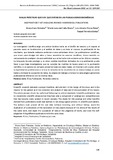Malas prácticas que hay que evitar en las publicaciones biomédicas
Fecha
2018-03Autor
Palabras Clave
Ética, Publicación, Voracidad editorialEthics, Publication, Predatory journals
Metadatos
Mostrar el registro completo del ítemResumen
La investigación científica exige una actitud bioética tanto en el diseño del estudio y el respeto al paciente como en la obtención y el análisis de datos y en todo el proceso de publicación de los resultados, que debería realizarse conforme a unos estándares éticos. Las publicaciones científicas, que sirven para divulgar del saber y hacer accesibles los avances científicos, tienen también un componente de prestigio y de competitividad que se ha hecho más evidente en los últimos decenios. La búsqueda de este prestigio y de otros posibles beneficios derivados de una publicación puede llevar a que haya investigadores que no cumplan las medidas de buena praxis en la publicación científica. A los autores les compete presentar todos los datos reales, sin inventar y sin ocultar, evitar la duplicidad de publicaciones e incluso la seriación de los resultados de un mismo trabajo en varios textos y rechazar la usurpación de datos, los plagios de trabajos e incluso los auto-plagios generando publicaciones diferentes con las mismas ideas.
Información Adicional
| Otros Títulos | Bad practices that should be avoided in biomedical publications |
| Editor | SABER-ULA |
| Resumen en otro Idioma | Scientific research demands a proper bioethical attitude both in the design of the study and in the respect for the patient as in the collection and analysis of data and in the publication of the results. The whole process should be performed following the ethical standards. Scientific publications help to disseminate scientific advances but they have also a component of prestige and competitiveness that has become more evident in recent decades. The desire for this prestige and other benefits derived from publications could lead authors to not doing a good practice in scientific publications. The authors must present all the real data -without inventing, and without hiding-, avoid the duplication of publications or the generation of new papers because of the slicing of the results of the same work, and reject the usurpation of data or the plagiaries of works, and even the self-plagiarism filling different publications with the same ideas. |
| Colación | 129-150 |
| País | Venezuela |






